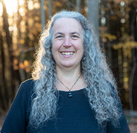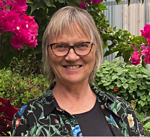We’re now in the dangerous, uncharted territory climate scientists have been warning about for decades. Meanwhile, biologists and toxicologists are sounding the alarm about surpassing the “planetary boundary” for chemical pollution, beyond which both ecosystems and our health are endangered.
We know climate change and chemical pollution are related in ways that can accelerate both crises, but does their interlinked nature also offer opportunities?
This CHE Café conversation, co-hosted with The New School at Commonweal, featured biologist and systems thinker Dr. Elizabeth Sawin and chemicals expert and clean production advocate Beverley Thorpe. The speakers explored opportunities to prioritize solutions that concurrently address climate change and the global crisis of chemical contamination — while also improving public health, equity and economic vitality.
Dr. Sawin introduced the “multisolving” approach she developed to help people identify and create win-win-win solutions, including tools to measure often overlooked co-benefits to help guide public policies and investments. Ms. Thorpe described how the escalating production of petrochemicals and plastics is contributing to the climate crisis, and how solutions based on both decarbonization and detoxification are essential if we are to protect health, address environmental injustices and slow climate change.
CHE Director Kristin Schafer moderated the discussion.
 Elizabeth Sawin, PhD is Founder and Director of the Multisolving Institute a think-do tank that helps people implement solutions that protect the climate while improving, equity, health, biodiversity, economic vitality, and well-being. Beth writes and speaks about multisolving, climate change, and leadership in complex systems for both national and international audiences. Her work has been published widely, including in Non-Profit Quarterly, The Stanford Social Innovation Review, U. S. News, The Daily Climate, and System Dynamics Review. In 2010, Beth co-founded Climate Interactive, which she co-directed until 2021. Since 2014, Beth has participated in the Council on the Uncertain Human Future, a continuing dialogue on issues of climate change and sustainability. She is a biologist with a PhD from MIT who has been analyzing complex systems related to climate change for 25 years. Beth trained in system dynamics and sustainability with Donella Meadows and worked at Sustainability Institute, the research institute founded by Meadows, for 13 years. Beth has two adult daughters and lives in rural Vermont where she and her husband grow as much of their own food as they can manage.
Elizabeth Sawin, PhD is Founder and Director of the Multisolving Institute a think-do tank that helps people implement solutions that protect the climate while improving, equity, health, biodiversity, economic vitality, and well-being. Beth writes and speaks about multisolving, climate change, and leadership in complex systems for both national and international audiences. Her work has been published widely, including in Non-Profit Quarterly, The Stanford Social Innovation Review, U. S. News, The Daily Climate, and System Dynamics Review. In 2010, Beth co-founded Climate Interactive, which she co-directed until 2021. Since 2014, Beth has participated in the Council on the Uncertain Human Future, a continuing dialogue on issues of climate change and sustainability. She is a biologist with a PhD from MIT who has been analyzing complex systems related to climate change for 25 years. Beth trained in system dynamics and sustainability with Donella Meadows and worked at Sustainability Institute, the research institute founded by Meadows, for 13 years. Beth has two adult daughters and lives in rural Vermont where she and her husband grow as much of their own food as they can manage.
 Beverley Thorpe is Co-Founder of Clean Production Action, and has researched and promoted clean production strategies to advance a non-toxic economy internationally since 1986. She was the first clean production technical expert for Greenpeace International on chemical and waste issues. Bev's work on alternatives to PVC, organohalogens and hazardous waste incineration helped drive momentum for safer substitution practices in company practices. As the NGO representative in the first United Nations Environment Programme for Cleaner Production, she promoted the value of public participation in industrial policies. Bev received her degree in Geography from Leicester University, UK and is an annual lecturer at Lund University in Sweden on chemicals policy and corporate practices. She is a past Director of Greenpeace International and a founding board member of the Story of Stuff in the US. She lives in Toronto, Canada.
Beverley Thorpe is Co-Founder of Clean Production Action, and has researched and promoted clean production strategies to advance a non-toxic economy internationally since 1986. She was the first clean production technical expert for Greenpeace International on chemical and waste issues. Bev's work on alternatives to PVC, organohalogens and hazardous waste incineration helped drive momentum for safer substitution practices in company practices. As the NGO representative in the first United Nations Environment Programme for Cleaner Production, she promoted the value of public participation in industrial policies. Bev received her degree in Geography from Leicester University, UK and is an annual lecturer at Lund University in Sweden on chemicals policy and corporate practices. She is a past Director of Greenpeace International and a founding board member of the Story of Stuff in the US. She lives in Toronto, Canada.
